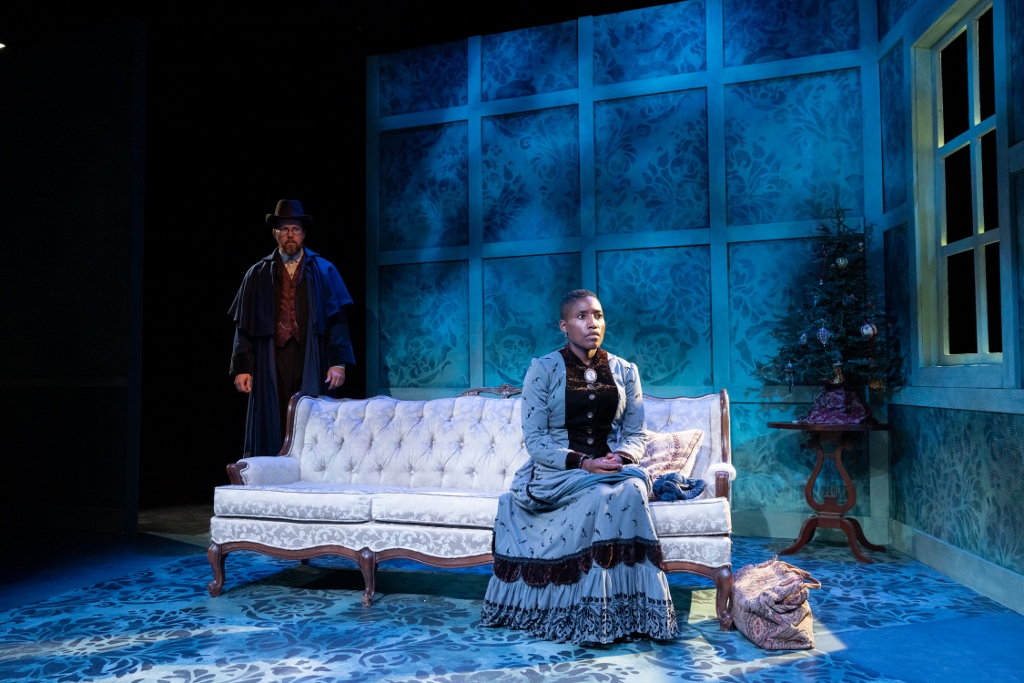
When Henrik Ibsen first wrote “A Doll’s House” in 1879, the play dissected many highly controversial cultural givens of his time. His masterful play recounted the story of Nora, a doll-wife, and her fight to maintain her individuality in a society where she was supposed to merge her “self” into her husband’s and children’s identity. When master filmmaker Ingmar Bergman assayed the tale, he had some of his own ideas and reflections that eventually morphed into NORA, a 1981 streamlined adaptation of Ibsen’s classic piece. To quote Bergman, “I see Helmer as a very nice guy, very responsible.” In fact, he opined that the story was really the tragedy of Helmer. From Bergman’s perspective, Dr. Rank is personable and caring, Nora’s childhood friend Christine is clever and self-sufficient, and – finally – the villain Krogstad is rather pathetic, a loser rather than a schemer. In 2024, Antaeus Company proudly presents the Ingmar Bergman version of events directed by Cameron Watson.

Jocelyn Towne and Mildred Marie Langford – Photo by Jenny Graham
The time is the end of the nineteenth century, and the place is the Helmer household. Nora (Jocelyn Towner) is the perfect wife who manages the perfect home. On the surface, she seems to be happy and content in her role of wife, mother, and homemaker. But is she really? Her husband Torvald (Brian Tichnell) is certainly ecstatic with the current state of affairs and loves his little songbird dearly.

Michael Kirby and Jocelyn Towne – Photo by Jenny Graham
But then catastrophe rears its unexpected head: When Torvald was very ill a few years before, Nora borrowed a goodly sum of money without her husband’s knowledge in order to fund his trip to southern climes so that he could regain his health. She had been faithfully repaying the loan and anticipated no problems. Then Nils Krogstad (Michael Kirby), the man who advanced the loan, comes to her for a special favor. It seems that Torvald is now his boss and wants to fire Krogstad due to an earlier scandal. If Nora does not help him, he threatens to let the world know about their arrangement. Suddenly Nora’s pretty and well-ordered little world begins to crumble around her. Bergman’s characters (down from Ibsen’s 11 to 5) are in a quandary.

Michael Kirby and Mildred Marie Langford – Photo by Jenny Graham
Kudos to Tichnell, Kirby, and Smith for their spot-on interpretations of some very complex men who have learned to cover up and deny effectively, all the while wielding a power inherent in their dominant roles in the society of their century. Kudos also to scenic designer Tesshi Nakagawa, costume designer Terri A. Lewis, light designer Jared A. Sayeg, and sound designer Jeff Gardner. All contribute to the creation of an effective ambiance.

Peter James Smith and Jocelyn Towne – Photo by Jenny Graham
NORA is a fascinating peek at a lady’s life in past centuries. It is also intriguing to compare Ibsen’s “A Doll’s House” with Bergman’s NORA, the former written by a man of the same century and the latter by a man of the following century. This is a thought-provoking play which is timeless and deals with “relevant themes of identity, societal expectations, and the pursuit of personal freedom,” to quote Antaeus Artistic Director Bill Brochtrup and Producing Executive Director Ana Rose O’Halloran.

Michael Kirby – Photo by Jenny Graham
NORA runs through May 26, 2024 with performances at 8 p.m. Fridays and Saturdays and at 2 p.m. on Sundays. The Antaeus Company performs at the Kiki and David Gindler Performing Arts Center, 110 East Broadway, Glendale, CA 91205. For information and reservations, call 818-506-1983 or go online.




Be the first to comment